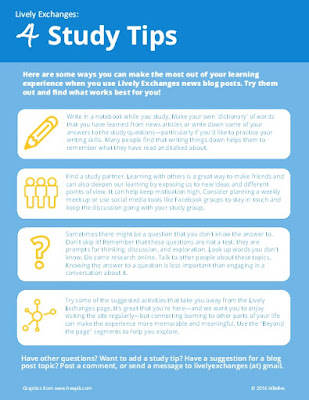Click on the embedded link above to read the article and see
photos on the NPR website.
This article is about the universality of body language. Word
count: 512
Before reading:
General Knowledge:
- What are some of the ways that people communicate without using words?
Speculate:
- Researchers analyzed video recordings of conversations with speakers of English, Spanish, Mandarin Chinese and American Sign Language. What do you think they discovered about facial expressions?
After reading:
Review and discuss:
- Write a 3-4 sentence summary of this article. Begin your summary with "This article is about…".
- In this article, researchers looked at facial expressions of speakers of English, Spanish, Mandarin Chinese and American Sign Language. Why do you think they chose these languages?
- According to Aleix Martinez, why is the "not face" more important than a "yes face"?
- Martinez doesn't think the universal "not face" is the result of globalization and technology. But how about other facial expressions or body language? Do you think that globalization will have a big impact on these in the future? Can you think of any current examples?
- What makes the Ohio State University study valuable? How might their research benefit society?
- In your opinion, what was the most interesting thing mentioned in this article? Why?
Reflect and evaluate:
- Consider the Ohio State University researchers' choice to use YouTube videos in their future research. Why do you think they chose this method? Are there any disadvantages to it?
- Think about the gestures, body language, or facial expressions that are common in your culture, or to speakers of your language. Pick 2 or 3 examples and try to write descriptions of them.
- Have you ever noticed an important similarity or difference in the body language of someone who speaks a different language than you? How did that affect your communication?
- Is there anything else you'd like to know about this topic? Do you have any questions that weren't answered in the article?
- What vocabulary words were new to you in this article? Make a record of what you have learned.
Beyond the page
- Pop quiz! How good are you at reading body language and facial expressions? Try one of these quizzes: Psychtests "Body Language Test" or Greater Good Science Center "Body Language Quiz"
- Body language plays an important role in politics, too. Watch this video as news reporters analyze the body language of some US presidential candidates: What Body Language Says about the Candidates. Or take a look at this article from the University of Alabama on candidates' body language: Debate body language: what presidential candidates are saying without words.
Join the conversation: add your thoughts about this article
in the comments section below!
